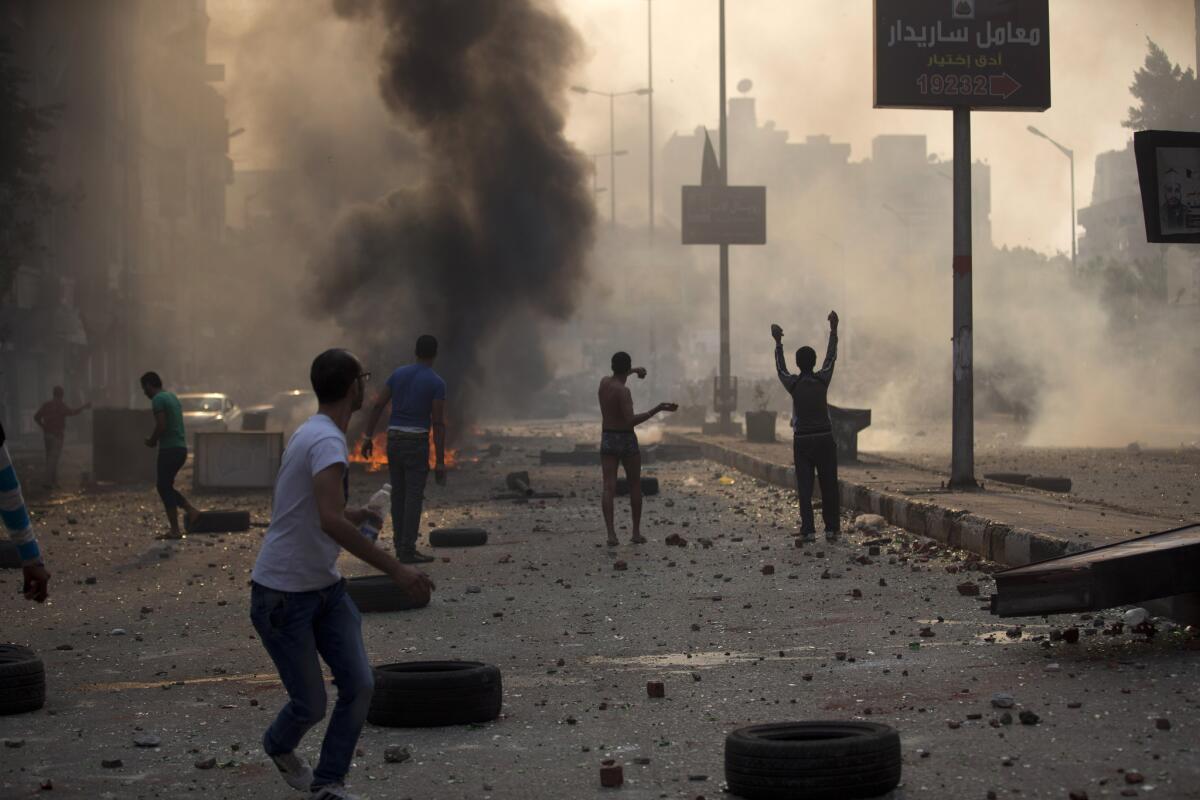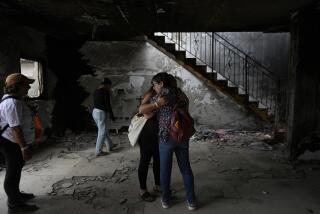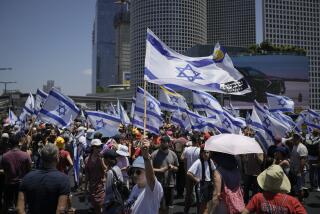At least 34 dead in Egypt as holiday turns violent

CAIRO — Clouds of tear gas wafted into the air and gunshots rang out Sunday as supporters and opponents of Egypt’s military-backed government battled one another in the streets on a major holiday dedicated to the army — clashes that underscored anew the country’s deep political divisions.
Government officials had urged the public to turn out en masse to commemorate a four-decade-old victory by Egyptian’s military forces at the start of the 1973 Middle East war, transforming the annual celebrations into a highly choreographed show of public support for the country’s most powerful man, Gen. Abdel Fattah Sisi.
Islamist groups staged counter-protests, triggering clashes that reportedly left at least 15 people dead and more than 80 injured in the capital and in a restive Nile Valley town, according to the ministry of health. A policeman was reported killed in the Sinai peninsula, where security forces have been fighting Islamist militants.
[Updated at 11:42 a.m. Oct. 6: Later Sunday evening, the Health Ministry reported that the death toll had risen to 34.]
Oct. 6 is celebrated every year as a national holiday, but this year it carried special resonance. The interim government, in power for three months, was eager to show the world that ordinary Egyptians solidly backed the army’s July overthrow of Islamist president Mohamed Morsi and the ongoing crackdown against his Muslim Brotherhood.
Fighter jets streaked overhead, horns honked, patriotic songs blared in streets and squares, schoolchildren chanted pro-military slogans, and flag vendors rejoiced at brisk sales as Egyptians hailed the opening salvo of the 1973 war — a surprise attack against Israel on the eve of the most solemn Jewish holiday, Yom Kippur.
In the fighting’s initial stages, Egyptian forces crossed the Suez Canal and staged a dramatic push into the Sinai. Israel’s military eventually managed to reverse those gains, and the war ended in an effective stalemate, though the latter part of the battle has been airbrushed from Egypt’s national narrative.
In their early hours, Sunday’s pro-army rallies across central Cairo had the ambience of a raucous street fair, albeit one watched over by ubiquitous troops and tanks. But by midday, Morsi supporters were gathering near several key Cairo mosques, and their numbers swelled throughout the afternoon. By dusk, clashes had broken out in several locales, and helicopters buzzed overhead.
Government supporters joined police and soldiers in driving back the Islamists, often hurling angry abuse. The pro-Morsi forces chanted anti-police and anti-army slogans and brandished the four-fingered symbol of the Rabaa al Adawiya mosque, where hundreds of Brotherhood backers died when security forces broke up protest camps in mid-August.
In the Nile Valley town of Dalga, south of Cairo, medical officials said one person was killed in clashes between security forces and pro-Morsi protesters. The fatal shooting of a police officer in Sinai occurred in the town of El Arish, in the northern part of the peninsula, according to local media.
Across Cairo, the military-sanctioned commemorations had the flavor of a campaign rally for Sisi, the army chief whose followers are urging him to run for president. Posters of the general’s stern visage fluttered everywhere, and marchers were fervent in their expressions of support.
“We are rejoicing at the victory of ’73 but also supporting the army today, because they stood by the people and carried out the people’s wishes,” said Mohammed Gamal, a mustachioed 26-year-old pharmaceutical company employee. Television commentators compared the Suez crossing to the current fight to eradicate the Aryan Brotherhood.
The months since Morsi’s ouster have seen a series of increasingly authoritarian measures by the interim government that succeeded him. A nationwide state of emergency remains in effect, giving the authorities sweeping powers to suppress dissent. Human rights groups say arbitrary detention is on the rise, together with the use of military courts to try civilians. Last week, it became an offense punishable by law to insult Egypt’s flag or national anthem.
At the same time, the government has become extremely sensitive about its public image overseas. Hours before the start of Sunday’s military celebrations, the government abruptly and without explanation freed two Canadian nationals — filmmaker John Greyson and physician Tarek Loubani — who had been detained for seven weeks without charges, held in what they described in a jailhouse letter as harsh conditions.
Throughout the day Sunday, security was stringent. Celebrants streaming into Tahrir Square, the epicenter of Egypt’s 2011 uprising against its autocratic president, Hosni Mubarak, first passed through metal directors, under the vigilant eyes of soldiers and paramilitary police. Backers of the brotherhood had tried several times in the last week to breach the square to hold demonstrations of their own, without success.
A woman helping police carry out searches of women entering the square expressed vehement disdain for the brotherhood. “They are less than the crumbs on a dirty floor,” she spat out.
Adding to the volatile undercurrent, some marchers expressed anger at the West because the U.S. and European governments were critical of the military’s ousting of Morsi, Egypt’s first democratically elected leader. President Obama and the European Union have pressed for the inclusion of the Islamists in the political process.
“You suffered from terrorism, so why do you support the terrorists?” one man yelled at an American reporter. “Why? I have one question. Why?”
ALSO:
Israeli girl shot outside her West Bank home
International soldier slain in Afghanistan by alleged private guard
U.S. forces carry out raids in Somalia and Libya targeting terror suspects
Hassieb is a special correspondent.
More to Read
Sign up for Essential California
The most important California stories and recommendations in your inbox every morning.
You may occasionally receive promotional content from the Los Angeles Times.










